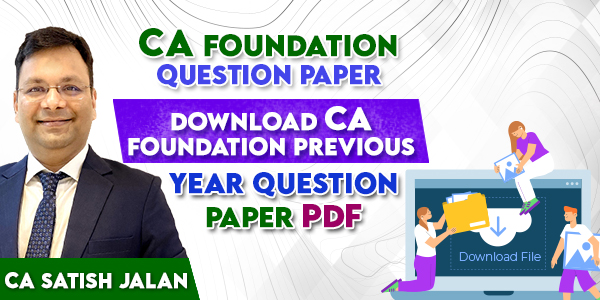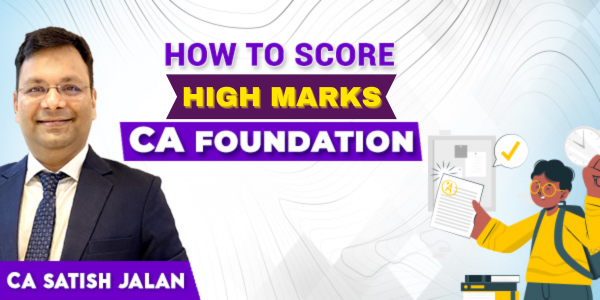16
Sep, 2023
How to Boost Learning Power in CA /CMA Exams ?
-
Exams, #CA&CMA
CA Satish Jalan
As a CA / CMA student, you are embarking on a rewarding and challenging journey to become a financial professional. The CA/CMA exams require a thorough understanding of complex concepts as well as the ability to apply them in real-world scenarios. To excel in these competitive fields, you must improve your learning ability and develop effective study techniques.
In this blog, we will look at various strategies and tips to help you improve your learning power and perform better in CA/CMA exams. These techniques have been carefully selected to meet the specific needs of CA / CMA students, with a focus on practicality, efficiency, and long-term knowledge retention.
For CA /CMA students, we will discuss the importance of a healthy lifestyle, stress management, and time management strategies. We'll also talk about the importance of curiosity, seeking out additional resources, and utilising technology to improve your learning journey. These techniques will help you focus, retain information, and improve your overall learning experience as a CMA student. Let us help you reach your full potential.
1. How to Improve Your Learning Power?
Engage in new and unfamiliar activities: Instead of sticking to familiar tasks, try new and unfamiliar activities. This encourages your brain to learn and develop new skills. Activities that push you out of your comfort zone force your brain to adapt and grow.
Some Tips to Improve Learning Skills and Concentration:
a) Concentration and Attention:
It is important to devote complete focus and attention to the task at hand for optimal brain-boosting. Make an effort to fully concentrate when learning a new game or tackling a difficult activity. This mental effort improves your brain's ability to complete tasks efficiently.
b) Physical Excercise:
Physical exercise, along with mental exercise, is essential for maintaining brain health. It keeps your brain sharp by increasing oxygen levels and lowering your risk of various disorders, such as memory loss. Aerobics and other activities that get your heart pumping are especially good for your brain. Physical activity also improves brain-eye coordination and helps with brain development.
Even if you don't have much time, a quick walk or a few jumping jacks can help your brain, especially during afternoon slumps or when you're mentally exhausted.
c) Proper Sleep Cycle :
Proper sleep is important for both your brain and body. Make sure you get enough time for quality sleep, as there is a significant difference between the amount of time you have to sleep and the amount of time it takes you to fall asleep. Proper relaxation through sleep is important, especially if you want to avoid problems during exams or other mentally taxing tasks. Make getting enough sleep a priority to support your brain's optimal functioning.
d) Hearty Laughs :
Laughter is an excellent way to improve your brain and overall health, especially during exams. Here are some suggestions for incorporating laughter into your daily routine:
Share your funny and embarrassing experiences with your friends. Take yourself lightly and find humour in everyday situations. It can be a fun way to relieve stress and refresh your mind.
Instead of wasting time wandering aimlessly, spend quality time with your friends and family. Their company can bring you joy and laughter, revitalizing your mind and improving your memory.
e) Balanced Diet :
Furthermore, eating a well-balanced diet is essential for brain health. Fish, walnuts, beans, spinach, broccoli, soybeans, and pumpkin are all high in Omega-3 fatty acids. These foods contain essential vitamins and nutrients that promote the health of your brain.
f) Maintain Motivation and Set Goals:
Having a clear purpose and goals for your learning endeavours can help you maintain motivation and focus. To stay motivated along the way, set specific, attainable goals and track your progress.
Active learning requires actively engaging with the material you are learning. Take notes, ask questions, and participate in discussions instead of passively reading or listening. Actively engaging with the information improves retention and comprehension.
g) Use Various Learning Techniques:
Experiment with various learning techniques to determine which ones work best for you. Visualizing concepts, creating mind maps, using mnemonic devices, and teaching the material to others are all popular techniques. Find the methods that work best for your learning style.
h) Take Regular Breaks and Manage Your Time Effectively:
Divide your study sessions into manageable chunks. According to research, short, frequent study sessions with breaks are more effective than long, continuous study sessions. Additionally, prioritize important tasks and avoid procrastination by managing your time wisely.
i) Accept Curiosity and Continue to Learn:
Develop a curious mind and a thirst for knowledge. Investigate new topics, seek out difficult tasks, and embrace continuous learning. Curiosity stimulates the brain, keeping it engaged and open to new information.
Remember that everyone's learning journey is different, so it's important to figure out what methods and strategies work best for you. Be consistent, persevere through difficulties, and celebrate your accomplishments along the way. Remember not to give up when faced with the challenges of demanding courses like CA/ CMA. By following the aforementioned tips, you can improve your memory and reduce stress levels while studying.
Popular Posts






No Comments